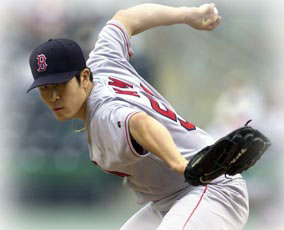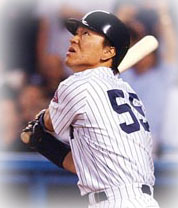<
|
|
|
|
There's Ichiro who's caught up in the drama surrounding the breaking of the record George Sisler set way back in 1920: 257 hits in one season. Suzuki broke it, then topped it by two in game 160 against the Texas Rangers at the beginning of October. Detractors sniped that Sisler had done it when the season had only 154 games instead of 162. Suzuki also must deal with those who point out that Sisler had more extra-base hits. Ichiro supporters reply that Sisler played in the deadball era and didn't have to face today's pitchers. No one has even come near the record in the last 30 years. The real drama remains in store: seeing whether Ichiro will succumb to the doubters and try to prove that he can do more than just slap a pitch every which way he pleases. I hope not, but the guy's only human. Just how human? That's one of the big dramas to unfold next season.

Red Sox pitcher Byung Hyun Kim has become baseball's Asian badboy following clashes with fans, the press and teammates.
|
Speaking of the Rangers, there's the Shakespearian tragedy of Chan Ho Park who came here back in 1994 for a chance to pitch in the majors. Within six years he became the Dodgers's ace starter, notwithstanding his taekwondo attack on a first-baseman who tagged him too hard. Overcome by hubris and greed, Park moved to Texas for $13.4 million a year, some of which was put up by A-Rod himself from his club-busting $24 million-a-year salary. In the ensuing two seasons injuries and a catastrophic loss of speed and control put Park on course to become the biggest bust in MLB history. Will Chan Ho admit his mistake and voluntarily take a 50% salary-cut to return to the Dodgers where he was happiest? Will he take the money and retire? Will he work his way out of the slump and prove the naysayers wrong again? Next season will tell!
Maybe Park can find solace in a heart-to-heart with former teammate Hideo Nomo who knows a thing or two about wandering in the desert. After inciting Nomomania with his corkscrew windup soon after his arrival in L.A. in 1995, Hideo's arm turned to rubber. One theory blames it on the Japanese press discovering his extra-marital fling with a TV anchorwoman. Whatever the cause, Nomo left L.A. and began moving from club to club, seemingly headed toward triple-A, then oblivion. In 2002 the Dodgers GM took a chance on their badly tarnished former star. The instant he returned home, Nomo's arm regenerated as though his fairy godmother had lifted an evil spell. For two seasons he earned Manager Jim Tracy's admiration as "the warrior". But this season, just when Tracy had every right to see Nomo as his ace, the curse returned. Nomo ended the season with a dismal 4-11 record and an 8.25 ERA, prompting Tracy to pull him from the rotation. Could this be the start of another desert walkabout?
The Dodgers's other Asian starter Kaz Ishii somehow got himself demoted to the bullpen in late September while holding a 13-7 win-loss record. That's partly because he's the only starter to have such an impressive record while pitching as many balls (98) as strikes (99). Some suspect Ishii's control suffered permanent damage when his skull was fractured by a line drive toward the end of the 2002 season. I cherish the hope that Tracy's secretly saving him for the desperate battles that await on the road to the Series. In fact, I am secretly harboring hopes of seeing Ishii, Nomo and Hee Seop Choi all rise up again to become post-season heroes. If so, and the Dodgers win the Series, I will put to rest my darkest suspicions: that a team with more than one Asian on the roster can't make it to the Series.
The Mariners — which has had on its roster Ichiro plus at least two Asian pitchers since 2001 — always unraveled late in the season. That has made me wonder if the presence of more than one Asian somehow disrupts team chemistry, possibly because of the incongruity between Asian stereotypes and the reality of Asian teammates. I know it sounds paranoid, but is it really too farfetched given the strength and persistence of Asian stereotypes in America? It doesn't allay my concerns that by mid September every Asian on the Dodgers roster had become sidelined. The only other team with an Asian star to make it into the playoffs are the Yankees. Hideki Matsui's 31 homers this season has quashed talk about the limitations of Asian sluggers in the majors. But Matsui is the Yankees's sole Asian. So how the Dodgers do in October and who they do it with will answer some questions that should be of interest to all Asian Americans.
There are many other Asian dramas that will play out in stadiums across the country next season: whether Kaz Matsui will come back from a disastrous first season after being hyped as potentially better than both Ichiro and Hideki Matsui; whether Byung Hyun Kim can be rehabilitated by the Red Sox after clashes with fans, the press and teammates; whether the Padres's Akinori Otsuka will turn out to be the year's biggest pitching discovery; whether Chinese Panamanian Bruce Chen will continue to justify his new starter spot on Baltimore's pitching roster.
There are nearly three-dozen Asians on major league rosters and every one of them has the potential to become a hero or villain of real-life dramas played out in front of millions of Americans. Today when you turn on a baseball game, there's a three-to-one chance of seeing at least one Asian in a key role. What other American sport, show or medium can promise those kinds of odds?
1 |
2
|
|
|
|
|
“That has made me wonder if the presence of more than one Asian somehow disrupts team chemistry, possibly because of the incongruity between Asian stereotypes and the reality of Asian teammates.”
|
CONTACT US
|
ADVERTISING INFO
© 1996-2013 Asian Media Group Inc
No part of the contents of this site may be reproduced without prior written permission.
|


